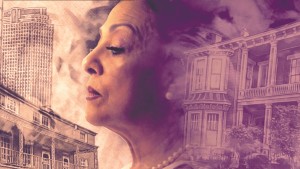For 100th birthday, French Quarter theatre stages local Black comedy
18th July 2016 · 0 Comments
By Christopher Tidmore
Contributing Writer
The new Le Petit play, “The High Priestess of Dark Alley,” is utter laughs and joy from beginning to end. The production also stands as arguably one of the most consequential plays on race and love within the New Orleans Black community in a generation.
It is the leadoff effort for Le Petit Théâtre du Vieux Carré’s 100th season’s goal, to increasingly feature local playwrights and directors, many of who seek to chronicle the experiences of the African-American community in New Orleans.
Which “High Priestess” certainly does. The plot centers around two 7th Ward two sisters living in the Treme just over a year after Katrina. The elder is frozen by her impending divorce from the philandering son of another prominent Creole family. Her only thaws of hope come from the associate pastor of her newly joined Protestant church, a contractor who has volunteered to fix her roof for free—as well as her housemate little sister, and the occasional streetwise joke from her sister’s boyfriend “Sweet.” 
The tension (and humor) comes from the sisters prominent Creole Catholic mother, who disapproves of their new romantic choices, new religious choices, and even culinary choices for Sunday dinner. But the matriarch in question, who schemes to reunite her elder daughter with her estranged husband, lacks an important piece of information.
Hilarity ensues, yet below the surface a conversation of race within the Orleans Black Community merges with other challenging topics—in the only way such a conversation can be had in the Crescent City, with laughter and elaborate Sunday dinners.
Local Playwright and Director Jackie Alexander describes High Priestess as “Two sisters, one robbed of her sexuality, the other defined by it, do battle with their domineering mother over the men they love.”
Alexander, when asked by The Louisiana Weekly how she managed to raise sensitive issues of color within the Black community and still make the subject matter funny, replied, “The story began as a woman’s journey to finding the strength to live life on her own terms. All my shows are set in/deal with life New Orleans, so I thought the issues of color I experienced in the city would be a good way to add authenticity, while also addressing an issue that’s seldom publicly discussed in the Black community.”
“As for the humor in the story, I’ve found that people are more open to truly listening when they don’t feel preached to; my way of avoiding that is by making them laugh. There is an endless cast of characters from my childhood that I pull from in finding humor, but the best way to make something funny is to write truthfully. Much of the dialogue in the play is pulled from conversations that I was either a part of, or listened in on. They weren’t meant to be funny, but when you look at/listen to them with an outside eye, they definitely can be.”
That local perspective in the theater is something that Le Petit’s Artistic Director Maxwell Williams has tried to foster as his historic French Quarter theater locale enters its centennial year. He explained, “New Orleans, as we all know, has this astoundingly rich literary tradition, and especially so when it comes to the dramatists here. And the city has always captured the imaginations of artists and audiences around the world, really. But in the last few decades, the authentic plays that come from here have had a hard time finding real visibility, with a few extremely notable exceptions.”
“We see it as our charge, along with producing gleeful entertainments and the best plays of the world canon, to shine as bright a light as we can on the richness of life here, by giving our city’s great writers the creative space they need to mature their work, and share it. We’re only just beginning, but I think we can be very useful in that respect.”
Williams was able to stage a cutting-edge local theatrical production, in part, because Le Petit is about to celebrate its 100th birthday. “The wonderful thing about a major anniversary like this is that it provokes you to look at the founding principles of the theatre, and ask whether or not those principles are still in practice, and if not, should they be? Are they still vital in the context of 2016 New Orleans?”
“It’s really interesting to me that if you look back, in the very early days of the theatre they were grappling with original works all the time, along with tackling some very challenging, even revolutionary plays from around the world. At the outset of the second 100 years, we want to get back to those founding principles, but do it in a way that draws strength and vitality from our entire community in an inclusive way that simply wasn’t imagined a century ago.”
And Williams is quick to add that there’s a way that the readers of The Louisiana Weekly can support the staging of local and African-American themed plays, and still have some fun while doing it. “The Curtain Call Ball on September 9 will be our second annual gala, and it’s going to build on the momentum of last year’s event, which was so much fun.
The High Priestess of Dark Alley runs through July 24, 2016. More Information at www.lepetittheatre.com.
This article originally published in the July 18, 2016 print edition of The Louisiana Weekly newspaper.



